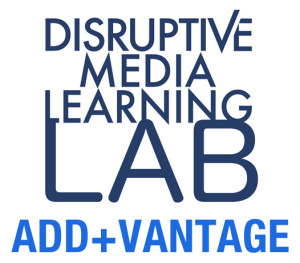Lab Contact: Jacqui Speculand
Team: Oliver Wood, Alex Masters, Kate Green, Debra James, Martin Jenkins, Gemma Tombs, Koula Charitonos
 Overview
Overview
Technology is evolving so quickly that devices and software skills are obsolete almost as soon as they are acquired. In this evolving scenario graduates will need to be adaptable and flexible, with the ability to identify new technologies and approaches to ensure that they are ready for, and ahead of, the market.
We have created an “empty” add+vantage module. The aim is to facilitate students’ independent learning and to support them in defining and negotiating their own learning paths.
In this module students work in groups and define a project of interest to them; identify the skills and knowledge required to complete the project; and develop a plan to acquire these skills and complete the project. They will be directed towards resources enabling them to learn new skills and complete the project.
Goals
- Explore independent learning: The project will consider how students choose to learn when they are left to determine the content and mode of learning for themselves.
- Evaluate team working and collaboration: The module requires students to work in groups towards a shared goal. They are required to negotiate their learning outcomes and tasks with support from an academic mentor.
- Evaluate the impact on student future learning.
Technology Application
Students identify the technology or skills required to support their learning. They are being offered access to Lynda.com - an online training platform in which they can learn computing and soft skills independently. Students are required to reflect on their progress through the module, and are offered support setting up a blog or journal in which they document their progress, learning and problems through the module.
Milestones
Iteration 1 (October - December)
-
October 2015
Module launch, project decisions and group formation. Team working badge awarded when groups formed and skills audited.
-
November 2015
Students present their progress so far on their learning and identify their skills and those to be learned. Reflection badge awarded to those who evidence blog / journal reflection.
-
December 2015
Term 1 module ends with presentations on the projects and learning through the term. Presentation badge awarded.
Iteration 2 (July - March)
-
January 2016
Module launch, project decisions and group formation. Team working badge awarded when groups formed and skills audited.
-
February 2016
Students present their progress so far on their learning and identify their skills and those to be learned. Reflection badge awarded to those who evidence blog / journal reflection.
-
March 2016
Module ends with presentations on the projects and learning through the term. Presentation badge awarded.
Iteration 3 (October 2016 - March 2017)
-
October 2016
Modules running across three levels with some very interesting projects being undertaken. These include: an app for Chinese students in Coventry, building a robotic arm, learning Chinese characters, language learning, research projects and cake decorating.
-
January 2017
All students on first term modules completed the module and presented their completed projects for assessment.
-
January - April 2017
Semester 2 modules underway.
Updates / Reflection
December 2015
- The module will end shortly - the presentations are being held on Thursday 3 December 2015. Students have worked hard on their projects and have evidenced learning through blogs and through project work. They have made use of Lynda.com to learn skills and have learned from each other to enhance their projects.
- The project will be evaluated to determine how engaged the students were in the learning process and if / how it may affect future learning.
- The impact of the open badges is being evaluated to determine if it motivated students and whether they perceive that there is value in them.
- The second iteration will begin in January with some changes to reflect the evaluation of the first iteration.
December 2016
- The presentations were incredible. Words fail me… the level of engagement, work completed and amount of energy invested in the module by the students was beyond all expectations.
January 2017
The modules in semester 1 ran well with a full range of activities for the students to support their learning. Working with Eline Kieft (from C-Dare) has been inspirational and has allowed us to incorporate some new and innovative changes in the module. As a dancer, she is a very tactile creative teacher who brought movement, activity and classical music into the teaching sessions.
Further Reading
- Blog Post: Can Students Design their own Learning?
Author: Jacqui Speculand
- Blog Post: Empowering Students to Design their own Learning
Author: Alex Masters
- Blog Posts: Design Your own Project
Author: Jacqui Speculand
Project Timeline:
Start dateOctober 2015 January 2016 October 2016 January 2017
|
End dateTBC |
StatusIteration 1 complete. Iteration 2 complete Iteration 3 - all 3 levels complete . Iteration 4 - in progress |
Associated Faculties, Schools and/or Course(s):
- Faculty of Arts and Humanities
- Faculty of Engineering, Environment and Computing
- Faculty of Health and Life Sciences
- Faculty of Business and Law
